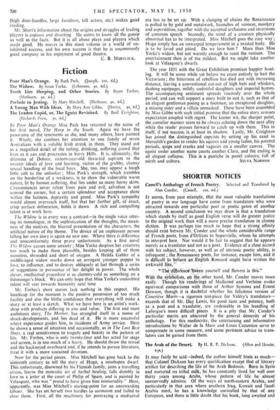Fiction
Poor Man's Orange. By Ruth Park. (Joseph. los. 6d.) The Widow. By Susan Yorke. (Lehmann. 9s. 6d.) Prelude to Jesting. By Mary Mitchell. (Methuen. 9s. 6d.) (Richards Press. 7s. 6d.) era has to be set up. With a clanging of chains the Renaissance is pulled in by gold and metalwork, haunches of venison, monkery and superstition, together with the accepted archaisms and inversions of common speech Secondly, the mind of a creature physically abnormal has to be interpreted. Miss Mitchell goes the easy way ; Hugo simply has an unwarped temperament in a twisted body. He is to be loved and pitied. Do we love him ? More than Miss Yorke's widow, but not warmly enough to roast the venison. The entertainment then is of the, mildest. But we might take another look at Velasquez's dwarfs.
The year 1851 with the Great Exhibition promises happier hunt- ing. It will be some while yet before we cease entirely to bait the Victorians ; the bitterness of rebellion has died out with increasing distance, leaving a conventional cut-out of high hats and whiskers, dashing equipages, mildly undutiful daughters and imperial hymns. The accompanying sentiment spreads viscously over the whole period, and can well support a story built to suit it, such as that of an elegant gentleman posing as a footman, an enraptureddaughter, a missing sister and a villain unmasked. These have been assembled by Miss Gibbs with such initial promise that the entire story arouses expectation coupled with regret. The keener wit, the sharper point, the comelier manner seem to be always echoing down the next alley while the reader presses forward to catch up with them. This in itself, if not success; is at least its shadow. Lastly, Mr. Creighton has joined the distinguished copyists by setting up his easel in Meredith's garden to render his squires and young ladies, his pointed periods, quips and cranks and vagaries on a smaller canvas. The egoist under another name courts another Clara, and the. ending is all elegant collapse. This is a pastiche in pastel colours, full of
IN Poor Man's Orange Miss Park has returned to the scene of her first novel, The Harp in the South. Again we have the panorama of the tenements as she, and many others, have painted it. Wisely, she confines her attention to one family of seven Australians with a voluble Irish streak in them. They stand out as a magnified detail of the toiling, drinking, suffering crowd that lives as it can and procreates in Surry Hills. It is, ultimately, the dilemma of Dolour, sixteen-year-old thwarted aspirant to the sweeter ideals of love and learning, victim of the grubby, clumsy sexual handling of the local boys. She, too, may appear a tough little colt to the onlooker ; Miss Park's strength, which trembles on the borderline of a weakness, is to• show the vulnerable warm nature, lit by human suffering, that lies under so many horny skins. Circumstances never relent from pain and evil, salvation is not _around the corner, but a certain splendour and acceptance shine within the laziness, depravity and greed. Miss Park's sympathy would almost overreach itself, but that her further gift, of exact, crisp surface delineation, holds it down. A rich and compelling talent is at work here.
The Widow is in every way a contrast—in the single voice utter- ing its monologue, in the sophistication of the thoughts, the mean- ness of the motives, the blurred presentation of the characters, the artificial nature of the theme. The device of an unpleasant person telling her own story is again no new one. Where there is difference and noncomformity these prove unfortunate. As a first novel The Widow causes some anxiety ; Miss Yorke despises her creatures too much to make them plausible, besides keeping all of them nameless, shrouded and short of oxygen. A Hedda Gabler of a middle-aged widow marks down an arrogant younger puppet to Jove, to influence, and to destroy obliquely at last through a series of suggestions in pursuance of her delight in power. The. whole 'clever, intellectual procedure is as clammy-cold as something on a 'fishmonger's block. We can only hope that Miss Yotke's undoubted talent will veer towards humanity next time.
Mr. Forbes's short stories lack nothing in this respect. His handicap for the moment is the positive possession of too much facility and also the blithe confidence that everything will make a 'story or at least a sketch. What we have here is an artist's work- shop with products differing in aim and value. The first and most ambitious story, The Mother, has strangled itself in a noose of shock-developments, and lies dead of it. He is more successful where experience guides him, in incidents of Army service. Here he shows a sense of situation and occasionally, as in The Last Best Days, a real sensitiveness to tragedy and beauty in the pattern of life. Mr. Forbes, who is only twenty-four and has acted for stage and screen, is in too much of a hurry. He should throw the trivial and the hackneyed overboard and, if he intends to pursue literature, treat it with a more sustained devotion.
Now for the period pieces. Miss Mitchell has gone back to the 'sixteenth century to tell the story of Hugo, a misshapen dwarf. This unfortunate, disowned by his Flemish family, joins a travelling .circus, learns the monastic art of herbal healing, falls dumbly in ,love as a jester at the court of Philip of Spain, and is painted by Velasquez, who was "proud to have given him immortality." Here, :apparently, was Miss Mitchell's starting-point for an unrewarding labour. She has set herself two hurdles to surmount and failed to ,clear them. First, all the machinery for portraying a mediaeval










































 Previous page
Previous page